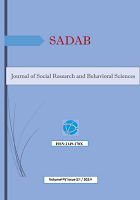Sûdî’nin Bostan Şerhi’nde Nesir Dili
Language of Prose in Sûdî’s Annotated Work of Bostan
Author(s): H. Ibrahim OkatanSubject(s): Language studies, Syntax, Turkish Literature, 16th Century, Sociology of Literature
Published by: SD Yayınevi
Keywords: Sûdî; Annotated Work of Bostan; language of prose; sentence construction;
Summary/Abstract: Sûdî is one of the representatives of 16th century Turkish classical prose literature. In his annotated work of Bostan he preferred quite a simple language, free from internal rhyme and compound words. He made his explanations short, using defining annotation style. As he pursued overall goal of language teaching, there are oft-repeated sentences of information in the work. His mastery over Persian language enabled Sûdî to meticulously work on the derivational and inflectional affixes. As the main part of speech necessary to understand a statement is the verb, there is quite a lot of information embedded in the work regarding the modality features of Persian verbs, whether they are transitive or intransitive, or whether they are affirmative or negative. There is information given as to in what sense phrases are used, which words pronouns refer to in the text, and how a pair of lines that conveys figures of speech should be inferred and understood. He severely criticized the authors who previously worked on Bostan due to their mistakes in their annotated works, their inadequate knowledge of Bostan, their sheer lack of comprehension of the sentences. It is obvious that he made use of Turkish, Persian and Arabic conjunctions, gerunds, participles and adverbials. There does not seem to be any particular use of artistic language in his prose. He produced a kind of prose a lot easier to understand than those used in his age.
Journal: Sosyal Araştırmalar ve Davranış Bilimleri
- Issue Year: 10/2024
- Issue No: 21
- Page Range: 657-697
- Page Count: 41
- Language: Turkish

